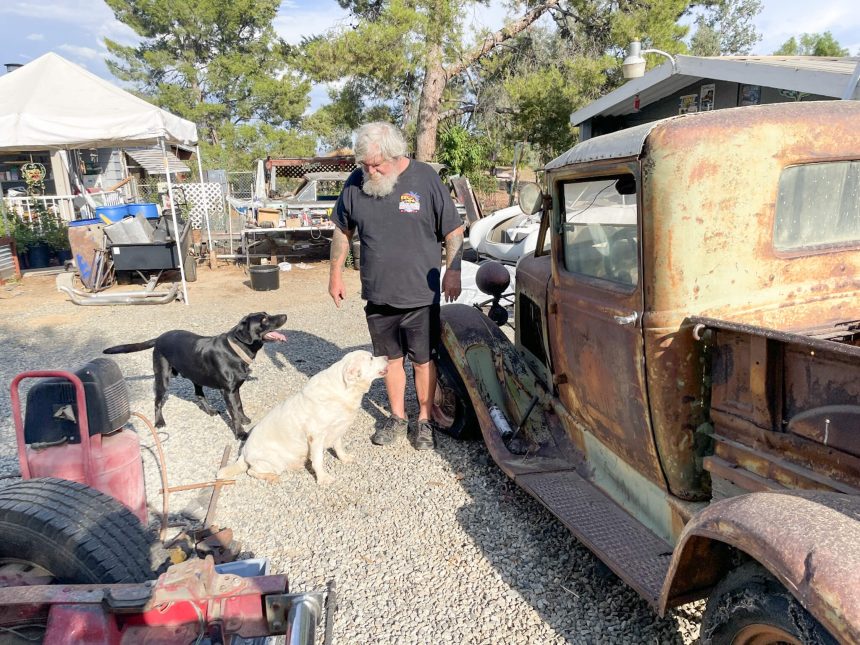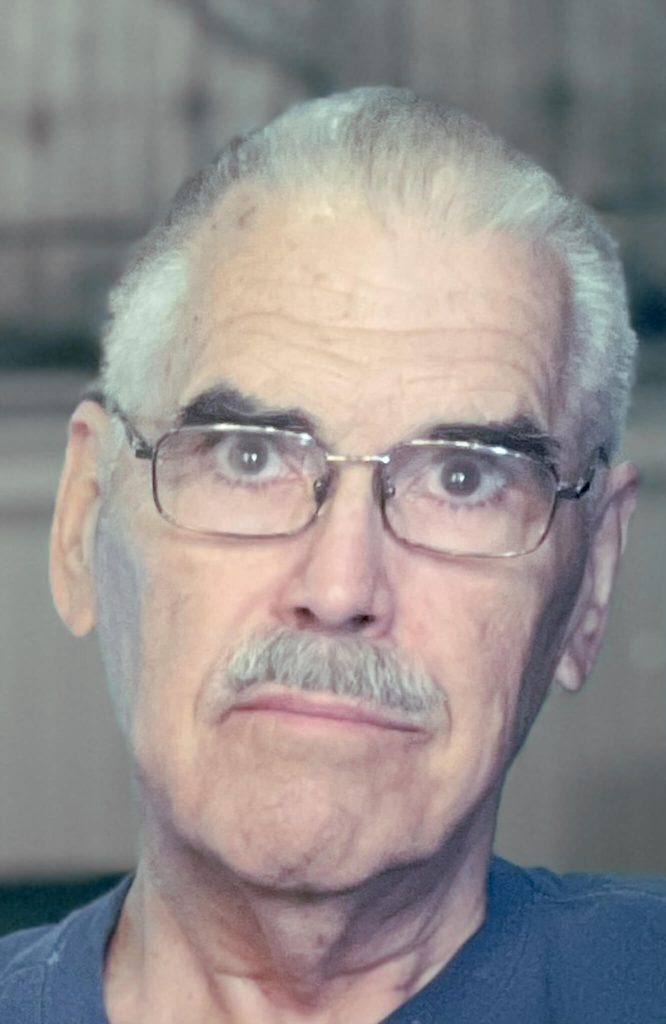

“I started working training dogs, and it just brought me to a really peaceful place in my life.”
Tim LeBlanc, Founder 4 Paws 4 Patriots
For the Love of a Pup, Vets Find Peace on Earth
By Don Ray
There are ongoing miracles happening in a mystical land called Menifee.
The name has always conjured up images in my mind of a magical land, beyond the back of beyond, where Little Jackie Paper frolicked with his faithful friend, Puff the Magic Dragon — the creature who the late poet Ogden Nash first created and referred to as a “realio, trulio, little pet dragon.”
Menifee also rhymes with ”Willoughby,” Rod Serling’s version of that peaceful paradise of a town from the past — a whistle stop on an old train line that transports an emotionally broken, modern man back in time to his dream destiny.
So, when a fellow disabled combat veteran described a place right here in Menifee called “4 Paws 4 Patriots,” I simply had to see it.
And, indeed, I would discover that there are realio, trulio, magical, miracles unfolding here — hundreds of them every year.
It’s where a once-broken man named Tim LeBlanc, just about daily, changes the lives of people who feel broken — or whose doctors or counselors have diagnosed as “psychologically” broken.
He does it by pairing up dogs — often themselves once abandoned or broken — with troubled veterans or with police officers who, in combat or even in training, became “broken,” and who now suffer from Post-Traumatic Stress Disorder (PTSD).
There are others, non-veterans, who suffer from PTSD or other psychological ailments that LeBlanc welcomes to his free training. He and his family provide each one of them with the right dog and unlimited training as well as any necessary equipment.
Nobody pays even a penny.
LeBlanc runs this not-for-profit, 501(c)(3), charitable organization — and it’s open to anybody who shows up — age and gender bedamned. It’s been his life’s passion for decades.
LeBlanc told me that he once had the opportunity to chat with the C.E.O. of one of the largest veterans’ charities.
“He asked me what my salary was, and I told him, ‘Well, last year I paid $50,000 to do this job,’ and he thought I was crazy.
“And maybe I am, but, you know, when I leave this world, I know that I’ve left it maybe just a little bit better place — at least for some people,” he said, “than it was without me. And what more can a guy ask for?”
The weathered face of this burly man in his mid-60s is surrounded by long, unkempt grey hair and a bushy grey beard. He dresses more like a summer tourist than that of a man who runs a thriving non-profit. The yard in front of the old, one-story house he shares with his wife Reta, and his own service dog is on a rural dirt road. At first glance, it looked to me like a refuge for old cars, old machinery, and other rusting, damaged collectibles — far from what I had expected.
It turns out that LeBlanc enjoys repairing and bringing back to life more than just broken veterans. We chatted inside a three-sided, sort of garage, seated next to the cooled air coming from a loud, old, evaporative cooler that sat on the ground between two of the many cars he’s restoring.
He described to me in painful detail how his father had suffered from the effects of fighting in World War II — effects they used to refer to simply as “shell shock.”
And he described the abuse his father had inflicted on him.
“It was not like we think of an abused kid today,” he said.” It was broken arms, broken legs —you know — pretty serious abuse.
“Not that my dad was a bad guy — he wasn’t, LeBlanc said. “He was struggling with, you know, mental health issues that really should have been addressed differently. And, you know, he would take it out on me.
“My dad was textbook — all the standard symptoms. Nightmares, couldn’t sleep, always hypervigilant. Yes, it was a rough childhood.”
He told me that he escaped into his own world where they were living in Huntington Beach in the early 1970s.
“I started working training dogs, and it just brought me to a really peaceful place in my life,” he said. “It was there, at the beach, that I found peace and happiness. So, I built a lifelong connection to animals.”
LeBlanc dropped out of school, he says, and joined the Army where he served as an airborne soldier in Panama at a jungle warfare training school.
“I did a little extraction work at the end of the Vietnam War.”
When he got out, he would soon learn that his combat experiences and injuries had exacerbated the PTSD he realized he had been carrying from his troubled childhood. So, he started training a dog to help him cope. Others saw what he was doing and asked him to help them train their own dogs.
“And it just turned into this whole thing of training service dogs.”
Today, he and his wife, Reta, live off his monthly Social Security benefits, his V.A. disability payments and the salary she brings in.
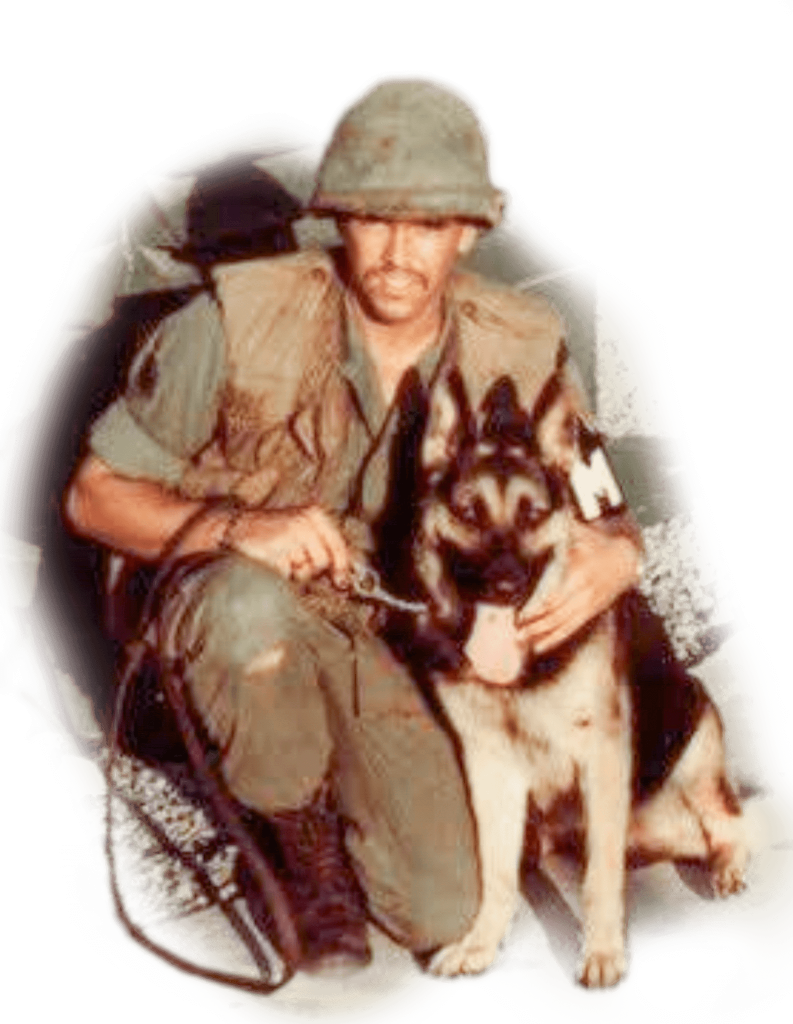
I should mention now, that my personal interest came from my own experiences. I too, was the victim of childhood physical and mental abuse. I also enlisted in the Army when I was 18 — also to escape from the house — and I would learn later that I, too, had carried with me a large dose of PTSD. And like Tim LeBlanc, I came home even more damaged.
And this wasn’t my first exposure to training and working with dogs. I spent a year in Vietnam as a dog handler with a 90-pound German shepherd named Fritz as my partner. He was my lifesaver and closest companion.
Compared to the way Tim LeBlanc trains service dogs, the Army stupidly had us train our dogs to attack any human who came anywhere near us — even fellow soldiers.
Many years later, to assist me in interacting with the world at home, I trained my own service dog, also named Fritz, from the time he was a puppy.
Indeed, I already knew how life-changing, empowering and curative a service dog can be. Fritz II, as I would refer to him, was my closest friend and companion (aside from my wife) for nine years.
We were heartbroken and devastated when he died suddenly in January of this year. Telling you about 4 Paws 4 Veterans is, itself, making me feel better. Now, back to the story.
The Sunday before last, I accepted Tim’s invitation to observe the weekly group training that begins promptly at 8 a.m. in a beautifully constructed, partially shaded training track and practice area — itself an oasis in a next-door field cluttered with old vehicles and rusting equipment.
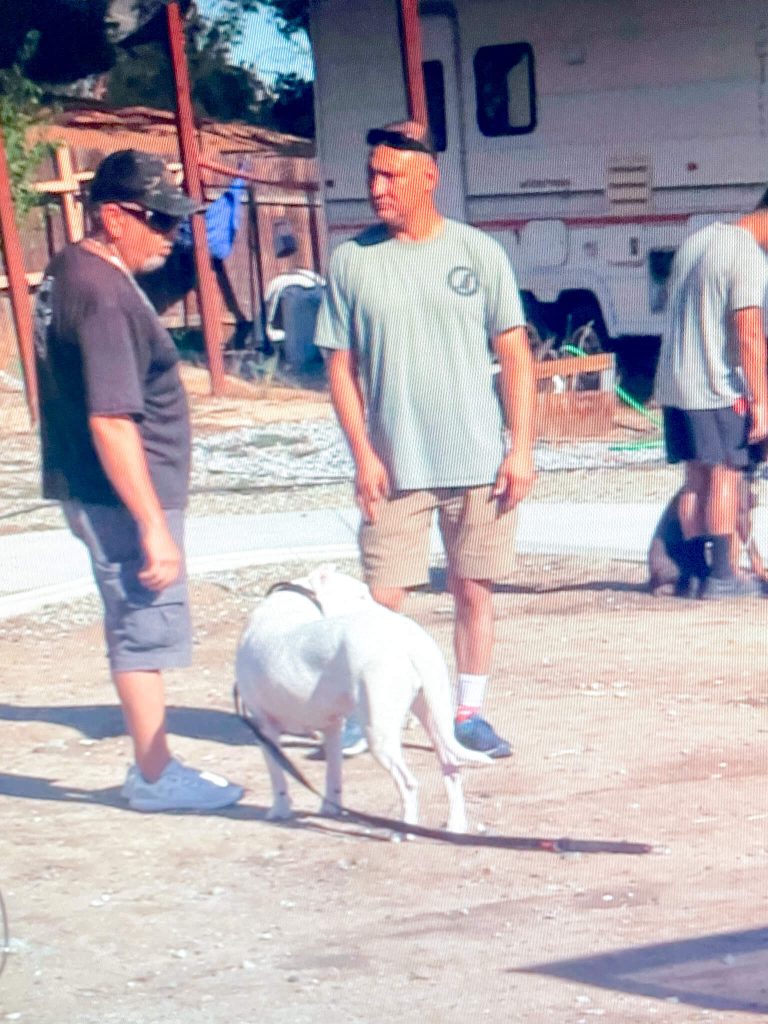
I got to see the remarkable lessons and exercises that one of LeBlanc’s talented trainers, John Flores, was coordinating.
The students and their dogs walked along both directions of the sidewalk that surrounds the center area where Flores stood, observed, and gave one-on-one tips and helpful remedies to the students. They practiced helping their novice dogs learn how to not be distracted by the oncoming teams, and they practiced giving gentle but firm commands to the dogs and then rewarding them with small treats. They also learned how to hold the leash and maintain the proper slack.
Afterward, Flores and Tim LeBlanc each provided praise, encouragement, and helpful hints to the dozen or more participants and their four-legged, future service dogs.
Javan Robinson was one of them. He had come from Laguna Niguel with his 8-month-old American Doberman, Remi. He told me he had spent a little over five years in the Marine Corps, but returned to civilian life still haunted by a tragic amphibious training accident that took the lives of eight fellow marines and a Navy corpsman in his unit in July of 2020, off the coast of San Clemente Island
“So, I had a lot of anxiety over that,” he said. That and other resultant problems prompted the folks at the V.A. hospital to recommend Robinson get a service dog.
He says that today, Reni is already coming to his aid when anxiety starts to overwhelm him.
The V.A. also pointed former marine Rafael Mendoza of Temecula to 4 Paws 4 Patriots. He says his dog, Maya, a “Dogo Argentino,” is about two-and-a-half years old. Mendoza recently got her from a rescue shelter.
“She was an overnight surrender,” he said. “They don’t know her history.
“When I first got her, she was really skittish about getting into the vehicle. But bringing her here, socializing, being around other people and animals, she’s been more comfortable.
“Now, I open the back of the car and she jumps right in,” he says, “because she knows that the ride is not a bad thing.”
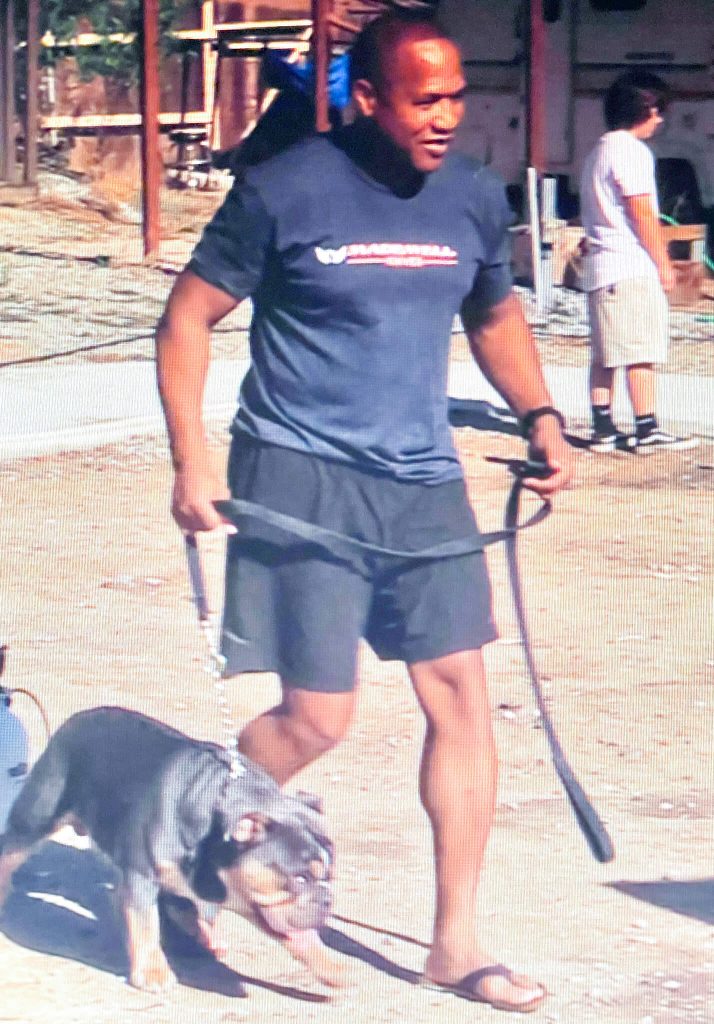
Tommie Patillo drove in from Lake Elsinore. He’s a retired Marine, a husband, and father of four grown kids.
Up front, he confessed he’d not been “a dog guy,” but that Tim LeBlanc changed that.
“The pup I have with me is the son of my service dog,” Patillo said with the 11-month-old English bulldog, Prince, at his feet. “This is his first year, and I wanted him to learn things just as his mom did.”
Prince’s mother, Cadence, is now two and a half years old. Patillo had served two tours in Iraq, but his PTSD was because of his earlier tour in Somalia.
“I was a young kid at 20 years old,” he said. “I didn’t really understand my emotions — I didn’t understand how to be a man.”
He turned to 4 Paws 4 Patriots two years ago when he realized that he needed someone to help him figure out how to deal with his PTSD.
“They helped me get over the finish line,” he said.
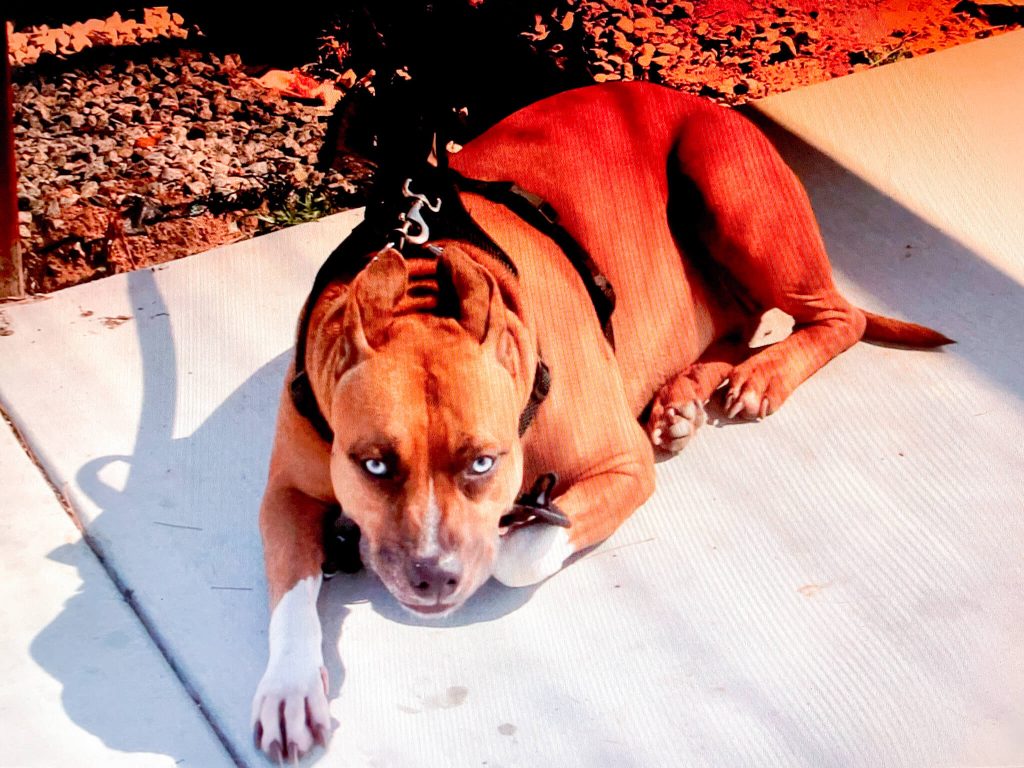
Stephen Huerta drove in from Riverside with his five-and-a-half-year-old pit bull, Sasha. At 55 — it was his birthday that day — he was the eldest student present. Past students have ranged as high as their 90’s. After departing the Air Force in 1997, due to personal challenges stemming from his childhood, Huerta said his life has been a challenge ever since. But Sasha helps him manage.
“She’s all I have,” he said. “I’m all alone.”
Sasha is his emotional support dog, always accompanying him to the library, government offices, on buses, and even to a group meeting he had been attending every morning for nine months.
“But then they voted her out,” Huerta said. “No more dogs.”
So, bringing Sasha to 4 Paws 4 Patriots for the first time, his goal is to transform her into an official service dog.
Hank is a three-year-old golden retriever who accompanied Dan Konnerth from Laguna Niguel. It was the team’s first time attending the group training class, Konnerth said, but he was already impressed with instructor, Flores.
“He’s a veteran who donates his time for this cause — understanding the anxiety that people feel coming back from Afghanistan,” Konnerth observed. “And the lack of trust that a lot of people experienced.”
When the training ended, I cornered Flores and discovered that he, himself, first came to 4 Paws 4 Patriots from Murietta to get help with his future service dog, Harley.
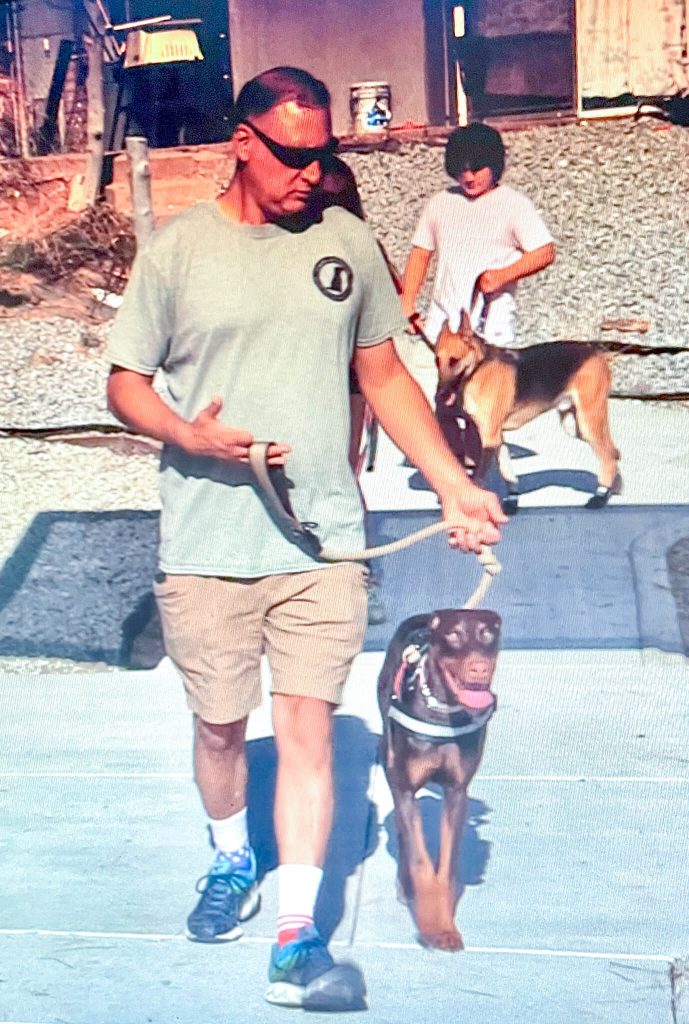
Trainer Flores revealed they became a pair not long after the Marine Corps medically retired him in 2015.
“I never really chased anything after retirement because the military kind of just said I was broken.”.
The V.A. recommended he get a service dog, but says he had no clue what the purpose would be — so he did his own research and soon found Harley.
When he went to Petco to buy a leash for her, Flores relates that a store employee disclosed she was volunteering at a place called 4 Paws 4 Patriots.
“She handed me their card and said, ‘Contact these people.’
“And, lo and behold, Harley started her journey,” Flores said, “and so did I.”
Long story short, Tim LeBlanc eventually recruited Flores to be an instructor.
That’s the kind of success story I’m always looking for.
I recalled Tim LeBlanc lamenting the reality that there seems to be no end in sight to the “miracles” he helps veterans and their dogs experience.
“What I want to do is train them till we don’t need anymore,” Leblanc had told me when we first met. “Until we stop having wars and putting people in a horrible position.
“And where I can train them for kids. That was my original plan, he said.
“I was going to train these disabled vets just for a while and then start helping kids — I wouldn’t have to keep doing this for vets forever.
“Well, the truth is, you know, we’ll never run out of disabled vets,” LeBlanc said, shaking his head.
A proud Vietnam Veteran, Don Ray is also a six-decade veteran multimedia reporter, writer, editor and producer for scores of print and visual media outlets. He as reported from Guatemala, Nicaragua, Mexico, the Philippines, Vietnam, Laos, Cuba, and trained journalists in emerging nations across Africa and Europe. You can reach him at donray@donray.com
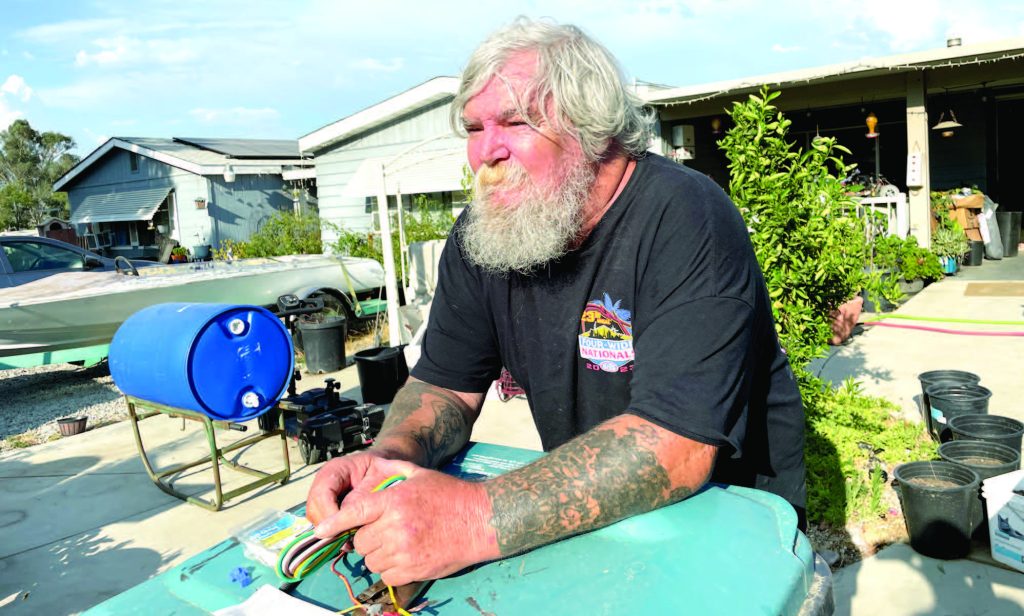
For More Ray of Light stories visit www.zapinin.com/ray-of-light.


